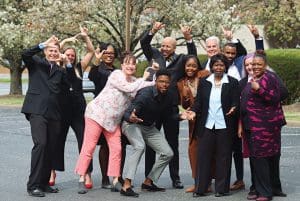SSFC in the Media
R.O.O.T.S Day in the Park 2023
Smart Start of Forsyth County is gearing up for their event titled, “R.O.O.T.S. Day in the Park” at the end of July.
Advertisement
The community is encouraged to sign up for the fun in advance so families can take part in all of the resources offered. Juwon Crowell, project Director of Smart Start Forsyth County joined the Local Vibe team to share the purpose of the event. Watch the video for more.
“R.O.O.T.S. Day in the Park” is Saturday, July 29 at Bailey Park in Winston-Salem from 11a.m. to 3p.m.
Read More
Giving Kids a Better Start…
A part of the $22.7 million in federal COVID relief funds that commissioners awarded last month, the grant marks the first time the county has given public money in support of the Pre-K Priority, a coalition of more than 80 pre-K leaders and advocates working to improve school readiness among local 4-year-olds for the last several years.
Read More
Forsyth Commissioners Approved First Public Investment for Pre-K Priority
The grant funding will go to Smart Start of Forsyth County, which will partner with many organizations in the Pre-K Priority for various efforts.
Read More
Press Releases
Smart Start of Forsyth County Announces 2023-2025 Officers and Committee Chairs
Place Matters: United Way Press Release
City of WS Transformational Grant
Forsyth Woman & Forsyth Family Features
Smart Start: The Pre-K Priority – November 2022
Research shows that high-quality, early learning through Pre-K better prepares children for kindergarten, increases test scores, and results in higher graduation rates and college attendance. So, why is access to affordable, quality Pre-K not a priority in Forsyth County? Well, now IT IS, thanks to the efforts of The Pre-K Priority, a collaborative of over 80 local early childhood education leaders and advocates.
Smart Start of Forsyth County and the Dolly Parton Imagination Library – October 2022
 Have you heard about the Dolly Parton Imagination Library and its impact in Forsyth County? Over 13,000 kids in Forsyth County receive its FREE books every month in the mail! That is 60% of the kids that are eligible for this program!
Have you heard about the Dolly Parton Imagination Library and its impact in Forsyth County? Over 13,000 kids in Forsyth County receive its FREE books every month in the mail! That is 60% of the kids that are eligible for this program!
Each month, the Dolly Parton Imagination Library (DPIL) provides an age-appropriate book (in Spanish or English) for each registered child in Forsyth County, absolutely free to the family. This program is locally managed by Smart Start of Forsyth County (SSFC).
Community: Smart Start of Forsyth County – September 2022
 The importance of early childhood education cannot be overstated. Early childhood education sets the foundation for a child’s future development, providing a strong base for lifelong learning, and also helps the child with cognitive and social development that is crucial to a strong future. As a community, we have to understand the importance of this crucial education to our children in our community. Early education is often overlooked and the early learning educators are frequently treated like babysitters at a daycare facility.
The importance of early childhood education cannot be overstated. Early childhood education sets the foundation for a child’s future development, providing a strong base for lifelong learning, and also helps the child with cognitive and social development that is crucial to a strong future. As a community, we have to understand the importance of this crucial education to our children in our community. Early education is often overlooked and the early learning educators are frequently treated like babysitters at a daycare facility.
Newsletters
October/November 2022 Newsletter
More News
$3.7 million in American Rescue Plan Act funds to support Forsyth County Pre-K classrooms|
SSFC Recognized with the Leaders in Diversity Award by the Triad Business Journal
US Early Years Climate Action Task Force Press Release
Adverse Childhood Experiences Press Release
Winston-Salem Foundation and Kate B. Reynolds Grant Announcement
Dr. Louis Finney, Jr. interview with 97.1
SSFC Presentation for Twin City Kiwanis Club May 11th, 2022
Smart Start of Forsyth County Launches R.O.O.T.S Program to Combat Childhood Trauma